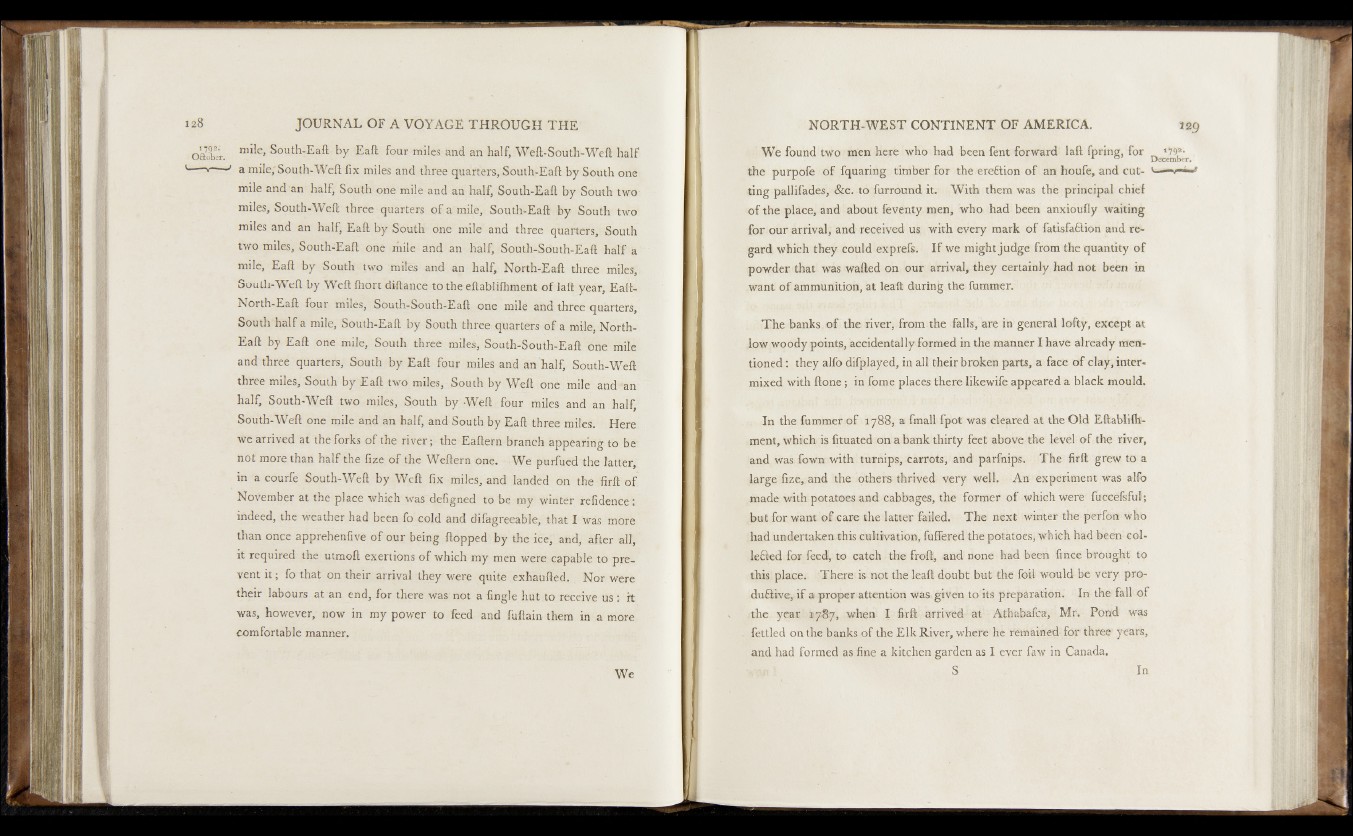
JOURNAL OF A VOYAGE THROUGH THE
mile, South-JSaft by Eaft- Four miles and an-hal fijWdft- South-Weft half
a-mile/Sputh-Weftfix miles-and three quarters,.South-Eaft bySouth oné
mile and-an' half; South one mile and an half, South-Eaft by^S’obfelji two-
miles, South-Weft- three quarters o f a'mile,< South-Eaflmby- South' two"'
miles and an half, Eaft by'South one mile*-and three -qhafters,*-South
two miles, South-Eaft onê mile and an half; SoutfoSduth-Eaft -half a
mile, Eaft ‘by South two 'fniles and agi- half,; North-Baft three mile^j
South-Weft by Weft lhort diftance to the eftablilhment of laft yèar, Eaft-
North-Eaft four mile^SOutfo-Soiith-Eaft, one mile' ancf three quarters,
South'half Ef mile, South-Eaft by South three- quartdrsof a mile;iN^tbh-
Eaft by Eaft One mile, South three miles^Sout-h-South-Eaft^# mile
and threé quarters; SOathby Eaft four miles a q d a nW f South-Weft'
three miles, South by Eaft two. miles, - South by Weft .©nè mile andean
half, Soi^Wgeft two miles^outh by'Wfft-four mjfcft;and an half^
South-Weft one toile and an half, and Sotfth by Eaft three miles. Here,
we arrived at theforks of the river;- the Eâftern branch- appearing tb he:
sot more than half the fize- of the- Weftern one. - We purfuedthe latter,
in a courfe South-Weft by Weft fix miles, and landed on tbe-ftrft of"
November at the place which'wag-defigned to be winter refideaëe*
indeed, the weather had been fo ; cold and difagreeable, that I was more
than Once apprehenfive of our being flopped by the ice;' and, after all,
it required the utmoft exertions of which my men were capable to prevent
it ; fo that on their arrival they'were quite exhaüfled. Nor were
their labours at an end, .for there was* not a fingle hut :to receive us ; it
was, however, now in my power to feed and fuftain them in a more
comfortable manner.
NORTH-WEST CONTINENT OF AMERICA.
^<’:We''foA^ft^oc«aaien'h@re who had been font forward laft fpring, for
the purpofe of fquaring timber for the ere&ion of an houfo, and cutring
pallifades,&c. them was the principal chief
<of the place, and about fevénty- men, who had been anxioufly waiting
for our arrival; and received us with every mark of fatisfoftion and regard
which they could exprefs. I f we niight judge from the quantity of
powder, that was wafted on our arrival, they certainly had not been in
want o f ammunition, at leaft during the hammer.
129
1792.
December*
The banks, o f the river,-from the falls, are in general lofty, except at
low wpody points, accidentally formed in the manner I have already mentioned
: they alfo difplayed, in all' their broken parts, a fade Of clay, intermixed
with f tone in fpme places there likewile appeared a black mould.
. In the fanamer o f a fmall fpot was cleared at the Old Eftablilh-
<ment, which, is fituated on a batik thirty feet above the level o-f the river,
and was: fowm with tu^ifips, carrots, and parfoips. The fir ft grew to a
forge ;6ze,.and Ithe others thrived very well. An experiment was alfo
made with potatoes and cabbages, the fortoer o f which were fueeëfsfol;
but for. wan&eifcane the latter foiled. The mixt'
;had undertaken«bis e®phivatk>n, fo&red t te pr^afdesj Whiefi had béen- col-
fe£fod far feecft t© catch the fr©i|, and none had been fince brought to
this! plane.: Thesreus* hot teäft döübt but’ ftë foil would be very prq-
dn£üve,,if ».proper attention was,. given tqiifo preparation.; In thbfallof
jthe year nySy, when I firft arrived; at■ Athabafoa, Mr. Pond was
fettled on the banks of the E lk River, where hè remainedfoplfctee* years,
and had formed as fine a kitchen garden as I ever faw in Canada.
S , IInn